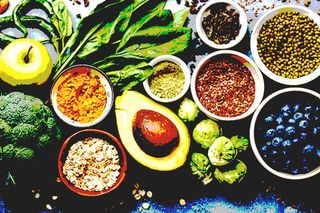
There’s No Such Thing As a Superfood
Kale will not help you cheat death.

We’ve been hearing about them for years now: superfoods. And every few months there’s a new one that is supposedly more nutritious, more life-saving, and more super than the previous items. You need to add it to your diet now the headlines scream. Except, the joke is, there really isn’t any such thing as a superfood.
What are ‘superfoods’?
Superfoods are foods – usually plants — that are considered highly nutritious. But there’s no standard metric to determine how nutritious a food has to be, or in what way, to get the label.
“Superfoods don’t have their own food group,” Despina Hyde, a registered dietician with the weight management program at New York University’s Langone Medical Center, told Live Science. “As a dietician, I think ‘superfood’ is more of a marketing term for foods that have health benefits.”
The history of the word ‘superfood’ itself might show just how far removed the term is from any consideration of health. Its origin lies in a marketing ploy by the United Fruit Company to get Americans to eat more bananas. Following medical studies that suggested bananas might help in treating Celiac disease (before gluten was identified as the problem), all-banana diets became popular and banana sales soared.
Which brings us to the second informal criterion for superfoods: they are typically backed by some sort of research linking them to extraordinary health outcomes. But that research is often questionable. Just take the avocado, one of the more recent foods to gain prominence as ‘super’: claims that it improves cardiovascular health are based on a study that was funded by the Hass Avocado Board — leaving the credibility of the findings to be taken with a pinch of salt. Or the goji berry, another recent superfood said to help prevent cancer and heart disease — even though there is no proof whatsoever to back up these claims.
Are there any extra benefits of superfoods compared to other food?
Yes — and no. Take the recent superfood-favorite, the avocado, for instance; it really does seem to be a superfood in that it contains a whole lot of nutrients. It has the mono-unsaturated fat (which can help with weight loss, lessen risk of heart disease, and reduce inflammation in the body) content of uncooked extra virgin olive oil or almonds; the dietary fibre (which helps regulate cholesterol and blood sugar levels) content of raspberries; a higher potassium (important for normal growth and building muscle) content than bananas; and roughly the same vitamin C content as sweet potatoes. (Vitamin C is a known antioxidant that aids in immunity and in clearing the body of free radicals, naturally occurring molecules that damage cells and DNA over time.) In other words, the avocado seems like the total package.
But, at the same time, it’s relative; lima beans contain more potassium than avocados, and cauliflower contains more vitamin C. Finally, avocados are high in calories, “So people have to be careful – they can’t just add an avocado a day to a bad diet and see health benefits,” says Penny M. Kris-Etherton, a professor of nutrition at Pennsylvania State University.
To make matters even more confusing, each of the food items discussed in this section — extra virgin olive oil, almonds, raspberries, bananas, sweet potatoes, lima beans and cauliflower — has been classified as a superfood itself, somewhere on the internet. So while some superfoods really do have wide nutritional benefits, others may be notable only for a high content of one essential nutrient — or may be simply in need of the kind of sales boost that typically comes with a ‘superfood’ label.
In other words, because a superfood can be anything, there’s no such thing as a superfood.
Some people say superfoods are full of antioxidants, and that antioxidants fight cancer. Is this true?
Honestly, no one has a definitive answer. Antioxidants are known to combat free radicals, which have been linked to Alzheimer’s disease and various cancers; therefore, foods rich in antioxidants are often billed as a way to reduce risk of and/or prevent these diseases. Some sources even claim that antioxidants can cure cancer.
The only problem is, there is no substantial evidence to show foods rich in antioxidants do this. In fact, years of people consuming an overabundance of antioxidants has proven that beyond a certain point, antioxidants may exacerbate cancer rather than prevent or fight it.
Which means that superfoods, including superfoods with antioxidants, can be good for you in moderation — just like all other unprocessed food.
Are there any downsides to eating superfoods?
In moderation? Probably not. In excess? Well, the above-mentioned research into excess antioxidants suggests a possible downside.
But not all fallout is health-related. Superfood crazes often impact farmers and the environment; for instance, Greek yogurt has been dubbed a superfood because it contains more protein than regular yogurt — but in 2012, it was reported that increased production had yielded vast amounts of an acidic byproduct that could kill plant life and wreck havoc on ecosystems if released with normal waste. Years later, producers are still trying to figure out how best to dispose of this byproduct safely.
So, what’s the bottom line?
If your choice is between a superfood and, say, something processed, like a muffin, the superfood is definitely a healthier choice. Or if your diet currently consists only of three food items, then sure — tossing in a superfood might be a quick win in terms of broadening the nutrients you give your body.
But, as the research into antioxidants make clear, there can be too much of a good thing. In the end, there’s no shortcut to a balanced diet — so rather than worry about super food, worry about a super-balanced diet.
Related


How to Help Someone You Worry May Be Suicidal
